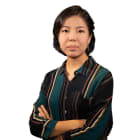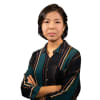CNA Explains: How prevalent is nose cancer in Singapore?
Members of Parliament Liang Eng Hwa and Baey Yam Keng are two high-profile cases of men in Singapore diagnosed with nasopharyngeal cancer. What are the risk factors, and how can you protect yourself?

An estimated 300 patients are diagnosed with nose cancer every year in Singapore. (Photo: iStock/Liubomyr Vorona)
SINGAPORE: It emerged on Wednesday (Jul 26) that MP Liang Eng Hwa was diagnosed with nose cancer, a disease his parliamentary colleague Baey Yam Keng was also struck with almost two years ago.
Both men were found to have early stage nasopharyngeal cancer, with radiotherapy the recommended treatment.
Mr Liang said he may have to take time off from his duties for a few months while Mr Baey, who after undergoing the same treatment, said in April 2022 that the tumour in his nose was gone, and DNA of the virus associated with the cancer was no longer detected in his blood.

Nose cancer is a “fairly common cancer in Singapore and Southeast Asia”, said Dr Donavan Eu, a consultant at the National University Hospital's department of otolaryngology-head and neck surgery. An estimated 300 patients are diagnosed every year in Singapore.
Other notable figures diagnosed with nose cancer include Singapore celebrity chef Sam Leong in 2016, and Malaysia badminton player and Olympic medallist Lee Chong Wei in 2018. Both have since recovered.
What are the risk factors of nose cancer, and how can you protect yourself against the disease?
RISK FACTORS
Nose cancer is more prevalent in men and individuals between the ages of 30 and 60, said Dr Eu.
According to the Singapore Cancer Registry’s 2020 report, it is the second most common cancer for men aged 40 to 49, and the third most common cancer for men aged 30 to 39. It is the ninth most frequent cause of male cancer deaths.
Besides having a higher incidence among men, nose cancer has a genetic predisposition to the southern Chinese ethnicity, said Dr Eu.
According to the Singapore Cancer Society, nose cancer is also associated with the consumption of salted soy beans, vegetables, fish and meat. The cooking of these preserved foods release fumes that contain nitrosamines, which are considered carcinogenic.
SYMPTOMS AND DETECTION
In the early stages, nose cancer may have no to minimal symptoms, said Dr Tan Chee Seng, senior medical oncologist at OncoCare Cancer Centre.
Early signs include nose bleeding, headaches, the sensation of blocked ears, nasal blockages and blood-stained phlegm.
As the disease progresses, patients may experience neck lumps and double vision. In more advanced stages, the cancer may spread to the bones and lungs, causing pain and breathing difficulty.
“The difficulty with nose cancer is that it is particularly silent in its onset,” said Dr Eu, pointing out how Mr Liang, the MP, had the “fairly innocuous” symptom of muffled hearing.
Diagnosing nose cancer requires a biopsy, Dr Tan explained, where a nasoscope (a thin, tube-like instrument with a camera) is inserted into the nose to extract a sample from a tumour.
TREATING NOSE CANCER
Treatment is largely dependent on the stage, said Dr Tan.
In very early stages, radiation therapy suffices and is typically given over six to seven weeks, he explained. But for locally advanced nose cancer, chemotherapy may be given alongside the radiation to improve survival rates.
Nose cancer is highly sensitive to chemotherapy and radiotherapy treatment, Dr Tan said, and a high percentage of patients would be cured if the disease is discovered early and treated appropriately.
PREVENTING NOSE CANCER
To prevent nose cancer, doctors recommend cutting down on salted foods and foods high in preservatives. Eating fresh fruit, green vegetables and other sources of antioxidants also helps to lower overall cancer risk.
As nose cancer can be passed on within the family, screening is generally advised in patients with family history of the disease, said Dr Eu.
“Early detection and diagnosis confer the best chance of cure,” he added.
If patients suspect they have symptoms of nose cancer, Dr Tan advises seeking immediate medical attention to confirm or rule out the disease.



















